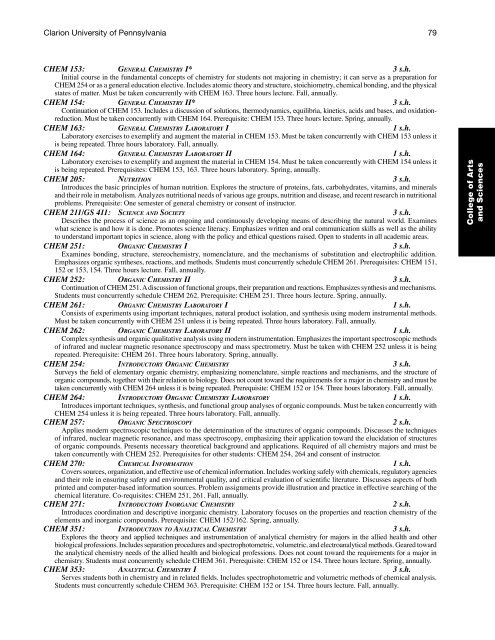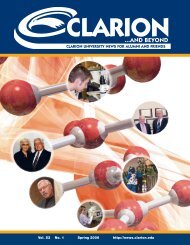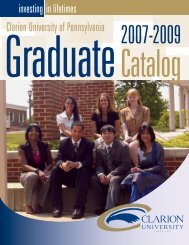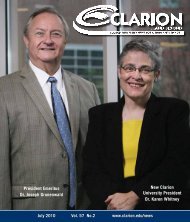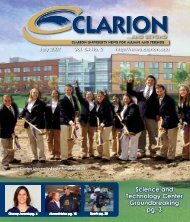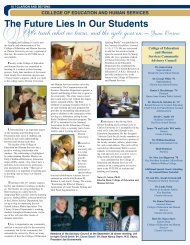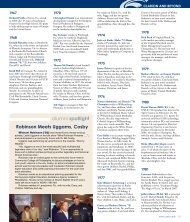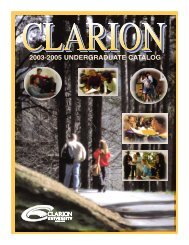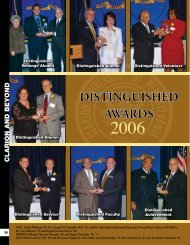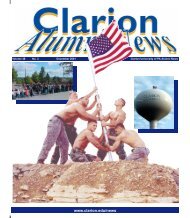Undergraduate - Clarion University
Undergraduate - Clarion University
Undergraduate - Clarion University
- No tags were found...
You also want an ePaper? Increase the reach of your titles
YUMPU automatically turns print PDFs into web optimized ePapers that Google loves.
<strong>Clarion</strong> <strong>University</strong> of Pennsylvania 79CHEM 153: General Chemistry I* 3 s.h.Initial course in the fundamental concepts of chemistry for students not majoring in chemistry; it can serve as a preparation forCHEM 254 or as a general education elective. Includes atomic theory and structure, stoichiometry, chemical bonding, and the physicalstates of matter. Must be taken concurrently with CHEM 163. Three hours lecture. Fall, annually.CHEM 154: General Chemistry II* 3 s.h.Continuation of CHEM 153. Includes a discussion of solutions, thermodynamics, equilibria, kinetics, acids and bases, and oxidationreduction.Must be taken concurrently with CHEM 164. Prerequisite: CHEM 153. Three hours lecture. Spring, annually.CHEM 163: General Chemistry Laboratory I 1 s.h.Laboratory exercises to exemplify and augment the material in CHEM 153. Must be taken concurrently with CHEM 153 unless itis being repeated. Three hours laboratory. Fall, annually.CHEM 164: General Chemistry Laboratory II 1 s.h.Laboratory exercises to exemplify and augment the material in CHEM 154. Must be taken concurrently with CHEM 154 unless itis being repeated. Prerequisites: CHEM 153, 163. Three hours laboratory. Spring, annually.CHEM 205: Nutrition 3 s.h.Introduces the basic principles of human nutrition. Explores the structure of proteins, fats, carbohydrates, vitamins, and mineralsand their role in metabolism. Analyzes nutritional needs of various age groups, nutrition and disease, and recent research in nutritionalproblems. Prerequisite: One semester of general chemistry or consent of instructor.CHEM 211/GS 411: Science and Society3 s.h.Describes the process of science as an ongoing and continuously developing means of describing the natural world. Examineswhat science is and how it is done. Promotes science literacy. Emphasizes written and oral communication skills as well as the abilityto understand important topics in science, along with the policy and ethical questions raised. Open to students in all academic areas.CHEM 251: Organic Chemistry I 3 s.h.Examines bonding, structure, stereochemistry, nomenclature, and the mechanisms of substitution and electrophilic addition.Emphasizes organic syntheses, reactions, and methods. Students must concurrently schedule CHEM 261. Prerequisites: CHEM 151,152 or 153, 154. Three hours lecture. Fall, annually.CHEM 252: Organic Chemistry II 3 s.h.Continuation of CHEM 251. A discussion of functional groups, their preparation and reactions. Emphasizes synthesis and mechanisms.Students must concurrently schedule CHEM 262. Prerequisite: CHEM 251. Three hours lecture. Spring, annually.CHEM 261: Organic Chemistry Laboratory I 1 s.h.Consists of experiments using important techniques, natural product isolation, and synthesis using modern instrumental methods.Must be taken concurrently with CHEM 251 unless it is being repeated. Three hours laboratory. Fall, annually.CHEM 262: Organic Chemistry Laboratory II 1 s.h.Complex synthesis and organic qualitative analysis using modern instrumentation. Emphasizes the important spectroscopic methodsof infrared and nuclear magnetic resonance spectroscopy and mass spectrometry. Must be taken with CHEM 252 unless it is beingrepeated. Prerequisite: CHEM 261. Three hours laboratory. Spring, annually.CHEM 254: Introductory Organic Chemistry 3 s.h.Surveys the field of elementary organic chemistry, emphasizing nomenclature, simple reactions and mechanisms, and the structure oforganic compounds, together with their relation to biology. Does not count toward the requirements for a major in chemistry and must betaken concurrently with CHEM 264 unless it is being repeated. Prerequisite: CHEM 152 or 154. Three hours laboratory. Fall, annually.CHEM 264: Introductory Organic Chemistry Laboratory 1 s.h.Introduces important techniques, synthesis, and functional group analyses of organic compounds. Must be taken concurrently withCHEM 254 unless it is being repeated. Three hours laboratory. Fall, annually.CHEM 257: Organic Spectroscopy 2 s.h.Applies modern spectroscopic techniques to the determination of the structures of organic compounds. Discusses the techniquesof infrared, nuclear magnetic resonance, and mass spectroscopy, emphasizing their application toward the elucidation of structuresof organic compounds. Presents necessary theoretical background and applications. Required of all chemistry majors and must betaken concurrently with CHEM 252. Prerequisites for other students: CHEM 254, 264 and consent of instructor.CHEM 270: Chemical Information 1 s.h.Covers sources, organization, and effective use of chemical information. Includes working safely with chemicals, regulatory agenciesand their role in ensuring safety and environmental quality, and critical evaluation of scientific literature. Discusses aspects of bothprinted and computer-based information sources. Problem assignments provide illustration and practice in effective searching of thechemical literature. Co-requisites: CHEM 251, 261. Fall, annually.CHEM 271: Introductory Inorganic Chemistry 2 s.h.Introduces coordination and descriptive inorganic chemistry. Laboratory focuses on the properties and reaction chemistry of theelements and inorganic compounds. Prerequisite: CHEM 152/162. Spring, annually.CHEM 351: Introduction to Analytical Chemistry 3 s.h.Explores the theory and applied techniques and instrumentation of analytical chemistry for majors in the allied health and otherbiological professions. Includes separation procedures and spectrophotometric, volumetric, and electroanalytical methods. Geared towardthe analytical chemistry needs of the allied health and biological professions. Does not count toward the requirements for a major inchemistry. Students must concurrently schedule CHEM 361. Prerequisite: CHEM 152 or 154. Three hours lecture. Spring, annually.CHEM 353: Analytical Chemistry I 3 s.h.Serves students both in chemistry and in related fields. Includes spectrophotometric and volumetric methods of chemical analysis.Students must concurrently schedule CHEM 363. Prerequisite: CHEM 152 or 154. Three hours lecture. Fall, annually.pages i-viiCollege of Artsand Sciences


